#character: margaret st. fleur
Text














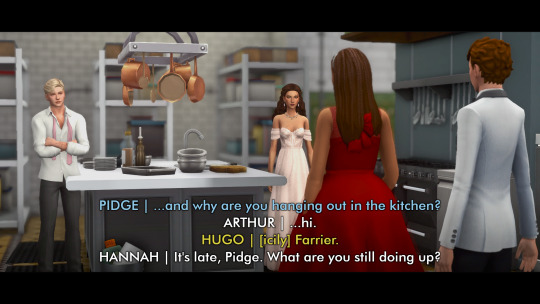
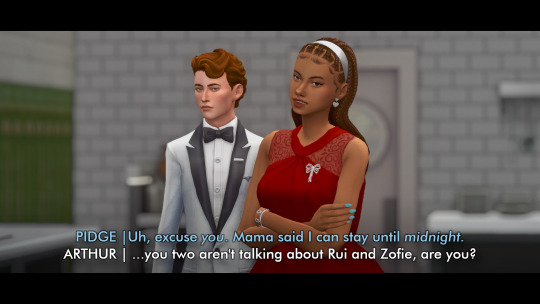





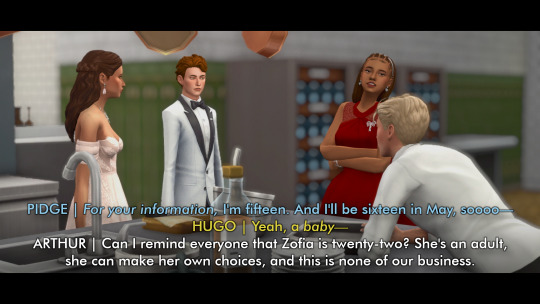








𝐕𝐀𝐋𝐄𝐍𝐓𝐈𝐍𝐄'𝐒 𝐃𝐀𝐘 𝟐𝟎𝟐𝟒 / ❛ boy crazy ❜ part two (@nexility-sims)
When Zofia walked into a room, everyone noticed. It might have been the enormity of her hair or the constant noise of her rings and bracelets or else the overwhelmingly sweet scent of her favorite body mist, but she was captivating in every sense of the word. Hannah had been jealous of her, once upon a time. It would have been impossible to grow up with her without any jealousy: next to Zofia, everyone became shabby and dull. Ranks didn't matter at all, no title or royal honor could ever compete with that kind of natural charisma. Hannah loved her, but there had been days when she'd hated her, too. Now, though, she was only grateful. When Zofia walked in, nobody noticed the rest of them slipping out.
read part one here
author's note: @nexility-sims and I have been working on the zofia/rui romance since....early 2022? some time in 2021? since #rufia has completely dominated 2/3 of our joint brain power for years, it seemed fitting to finally let them out of our DM's to celebrate Love Day Valentine's Day. Happy V-Day, everyone!
Transcript under the cut.
CHEF | Aren't long nails against dress code, anyway?
SERVER | [laughs] Girl, I don't give a fuuu—
SERVER | You wanna know who else is wearing acrylics tonight?
CHEF | [bored] I dunno, who?
SERVER | Oh, nobody, just the Princess Zofia.
CHEF | [gasps]
CHEF | Shut. Up. You actually talked to her? What was she like?
SERVER | She's fucking gorgeous. Like, obviously, but up close, she's even more beautiful.
CHEF | Yeah, yeah, but what was she like?
SERVER | Okay, so I didn't actually talk to her because she was all over her new boyfriend. They were like, so into each other. It was so sweet.
CHEF | Really? I heard it's just a PR relationship so people will think she's over Sigis.
SERVER | No way! They're obviously crazy abut each other. You can't fake—
UNIDENTIFIED MAN | [offscreen] EVERYBODY OUT!
HUGO | What, do I gotta say it again? All of you, clear out!
HANNAH | [sighs] Please excuse us.
HANNAH | My cousin and I need somewhere to speak privately. Will you please excuse us for a moment?
CHEF | ???
SERVER | [shrugs]
HUGO | ...anyway, did you see it?
HANNAH | See what?
HUGO | That stupid little hair flip. He did it a million times.
HANNAH | He's growing it out for her.
HUGO | Really? Hard to believe, he's so fucking vain.
HANNAH | She told me she asked him to grow it long. [deep, beleaguered sigh] She thinks it's sexy.
HUGO | What, are you for real?
HANNAH | Oh yeah. She's always had a thing for guys with long hair.
HUGO | ...huh.
HANNAH | Anyway...what's your take? Personally, I don't see what she sees in him.
HUGO | [snorts] He's better than Marshall.
HANNAH | That's the world's lowest bar. Subterranean, in fact.
HUGO | So what are we going to do?
HANNAH | He's not a dog, we can't just run him off.
HUGO | Well, you can't, but maybe if I—
PIDGE | [offscreen] HEY! What are you two talking about?
PIDGE | ...and why are you hanging out in the kitchen?
ARTHUR | ....hi.
HUGO | [icily] Farrier.
HANNAH | It's late, Pidge. What are you still doing up?
PIDGE | Uh, excuse you. Mama said I can stay until midnight.
ARTHUR | ...you two aren't talking about Rui and Zofie, are you?
HUGO | ...
HANNAH | ...no.
PIDGE | You two are such LIARS!
PIDGE | Both of you are judgy control freaks! I thought he was really nice.
HUGO | He could barely string a sentence together.
ARTHUR | I mean...Armorican is his third or fourth language, isn't it?
HUGO | Whatever! He gives me the creeps.
HANNAH | Well, she says she's in love.
HUGO | [scoffs] In love? They've known each other for six months.
PIDGE | So? What if it was love at first sight?
HANNAH | [exasperated] Pidge—
HUGO | Just ignore her, she's fourteen.
PIDGE | For your information, I'm fifteen. And I'll be sixteen in May, sooo—
HUGO | Yeah, a baby—
ARTHUR | Can I remind everyone that Zofia is twenty-two? She's an adult, she can make her own choices, and this is none of our business.
HUGO | You're right, Farrier. It's none of your business.
HANNAH | [offscreen] Hugo, enough.
PIDGE | [mouthing] Rude.
HANNAH | Arthur, what was your read?
ARTHUR | I don't know, and I don't want to form a judgment until I've actually gotten to know him. He seems...fine? On par with the other guys she's dated.
HANNAH | [sighs] "On par with all her other boyfriends" is the entire problem.
HANNAH | I just don't want her to get hurt again. This happens every time, you know? She falls hard and fast and then the guy turns out to be a scum-sucking lowlife.
PIDGE | [laughs] Hellooooo, what about Van? He was—
HANNAH | Probably thw worst of all of them. Trust me, Pigeon. He's...he's no good.
HUGO | [jokingly] You see, baby bird? That's why you're not allowed to date until you're thirty and why Hannah's gonna join a convent—
PIDGE | No way, that's not fair.
HANNAH | [tiredly] Hugo, shut up. No one asked.
PIDGE | Yeah, Hugo. No one asked.
ARTHUR | Look, I think we should at least give the guy a chance.
HANNAH | [sighs] I guess we owe her that much.
PIDGE | Guys, I actually talked to him, and trust me: he is like, sooo nice.
HUGO | ...
HUGO | I bet I could take him.
PIDGE | Hey! Hannah, did you hear what he just said—
#armorica story#behind the scenes#character: hugo st. fleur#character: hannah st. fleur#character: margaret st. fleur#character: arthur farrier#holiday special
50 notes
·
View notes
Photo
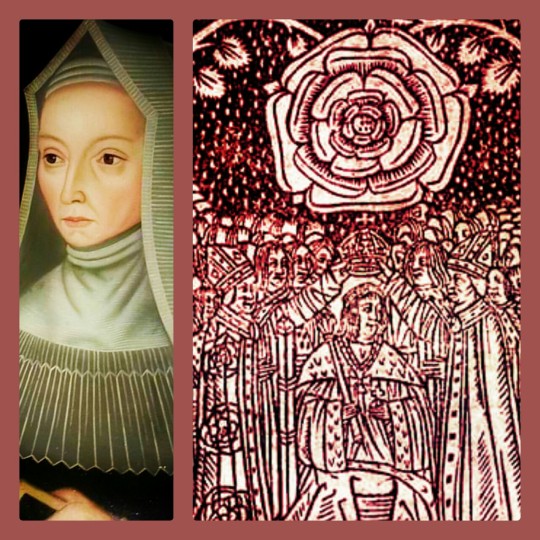
🌹 A Proud and Grand Matriarch 🌹
King Henry VIII’s joint coronation with his equally praised consort, was not just a triumph for the Tudor Dynasty; it was a personal triumph for his grandmother, the Countess of Richmond, Margaret Beaufort.
Throughout her life, Margaret had sacrificed everything, done the impossible, to keep her only son safe. Her confessor, John Fisher, Bishop of Rochester, said that twice in her life, she had cried tears. First for her son and secondly for her grandson. For the former, her tears were both of fear and joy while for Henry, her tears represented the relief and gratitude she felt for having seen her son’s dynasty last this long, as well as being witness to the first peaceful transition of power in a long time.
In her biographical work on the Tudors (“Tudor. Passion. Manipulation. Murder: The Story of England’s Most Notorious Royal Family”), notes the following:
“A fortnight after the wedding Henry and Katherine were crowned together as king and queen. The ceremony lasted four days and began on 21 June with Henry VIII taking formal possession of the Tower. There, the following night, he created his Knights of the Bath. This ceremony, which only took place on the eve of a coronation, involved the new knights bathing in a symbol of purification, before a vigil spent in prayer until dawn. The next day the knights led the newly-weds on the eve of coronation procession to Westminster through streets hung with tapestries. Henry was mounted on a princely horse in a jewelled costume, while Katherine, dressed in white, was carried in a litter pulled by white horses. Her long auburn hair ‘beautiful and goodly to behold’ hung loose under a golden circlet of six crosses and six fleurs-de-lys, studded with precious stones and ‘new made’ for her. When a summer rainstorm broke Katherine was forced to take refuge under the awning of a draper’s stall. But it passed as quickly as it had arrived and the happy procession continued in front of the cheering crowds. The next day Henry and Katherine were crowned at Westminster Abbey and Margaret Beaufort wept as many tears as she had at her son’s coronation. She remained fearful, John Fisher recalled, ‘that some adversity would follow’. A few days later, while staying at the abbot’s house at Westminster, Margaret became ill. The cygnet she had eaten had upset her stomach. It was only two months since her son had died and Margaret did not have either the emotional or physical strength to recover. Fisher was present at her death, a mere five days after her grandson and his wife were anointed king and queen. Margaret Beaufort was buried in the Lady Chapel at Westminster Abbey where her son had so recently been interred. She had decreed in her will that her Book of Hours, in which she had marked such key events as her son’s victory at Bosworth and Henry VIII’s birth, should be kept on display there. Her black marble tomb was to be surmounted with a bronze effigy created by the Florentine sculptor Pietro Torrigiano. The face he cast expresses her forceful personality. Margaret had survived the dangers of her son’s birth. She had helped protect him during the years that followed, and risked her own life to conspire on his behalf against Richard III. In promoting her son as king, she had sacrificed her own superior claim to the throne. But although she accepted male authority she had wielded considerable influence. Margaret had used her experience of English court ceremony to place the Tudors firmly within royal tradition, drawing up the orders for future royal christenings and funerals. Her best servants became the king’s, and he had continued to trust her judgement to the end. No wonder she came to sign herself in the regal style, Margaret R. The obituary sermon Fisher gave her noted that Margaret would be greatly missed. Her female friends and relations, ‘whom she had loved so tenderly’, her priests and servants, ‘to whom she was full dear’, indeed, ‘all England for her death had cause for weeping’. Margaret had been an important patroness to the universities, especially Cambridge; she had also been generous to the poor, while her passion for chivalric virtues had, Fisher said, made her an ‘example of honour’ to the nobility. It was her spirituality that he admired most, later commenting that although ‘she chose me as her director … I gladly confess that I learnt more from her great virtue than I ever taught her.’ If Henry VII had had a good death, reconciled to God, Fisher believed Margaret had led a good life. In later generations, however, Margaret’s reputation would fall victim to religious and sexual prejudice. In the post-Reformation England of the seventeenth century Margaret’s spirituality came to be judged mere superstition and her intelligence and toughness of character were regarded with equal suspicion. The antiquarian Sir George Buck condemned Margaret Beaufort as a ‘politic and subtle lady’ who had killed the princes in the Tower with sorcery and poison to clear the way for her son. That Margaret was responsible for the princes’ deaths is a theory becoming fashionable again and remains linked to cultural prejudices. Margaret’s support for her son had been construed as those of an obsessively ambitious mother, yet for her generation she was fulfilling a duty. She was honour bound to help him regain his rightful inheritance, and later to help him restore the House of Lancaster, into which she had been born. Her strict religious devotions are, to modern sensibilities, strange, even fanatical, but amongst royal and noble women of her time they were commonplace: an effort to look beyond the vicious and ruthless political culture into which they were born, to understand humility, and the nobility of Christ’s example. The absence of portraits of Margaret Beaufort as an attractive young woman to counterbalance the images of her in old age have helped give credit to the sinister reputation she has gained. But the face that stands out from her story is not that of the widow with the hooded eyes, praying amidst the riches of a royal chapel and seen in her portraits, but a young girl, riding in the biting wet of a Welsh winter, to Pembroke Castle where she must deliver her child. Now it was for her grandchildren and great-grandchildren to continue the Tudor story.”
Indeed. Margaret, willed herself to live this long enough to see the crown being passed to the next generation without any bloodshed. England had enough of those. Henry’s accession and powerful display of imagery represented a return to England’s glory days. She was aware of this, and it is why she cried once again in seeing another Tudor wearing the crown of St. Edward the Confessor.
Margaret had lived in a tumultous time. She had endured many personal tragedies, outlived most of her family, including her son, but lived long enough to see this shining moment in Tudor history. Days after her grandson’s coronation, she retired to the Deanery in Westminster Abbey. She died on the 29th of June, five days after Henry VIII’s coronation and a day after his eighteenth birthday.
The celebrated Humanist philosopher Erasmus wrote a Latin inscription for her tomb which in English reads: “Margaret, Countess of Richmond, mother of Henry VII, grandmother of Henry VIII, who donated funds for three monks of this abbey, a grammar school in Wimborne, a preacher in the whole of England, two lecturers in Scripture, one at Oxford, the other at Cambridge, where she also founded two colleges, one dedicated to Christ, and the other to St John, the Evangelist.”
John Fisher’s funeral sermon echo what most of contemporaries thought of her: “She was a bounteous and liberal to every person of her knowledge or acquaintance. Avarice … she most hated, and sorrowed it full much in all persons, but especially in only that belonged unto her … Unkind she would be not unto any creature, nor forgetful of any kindness or service done to her before … She was not vengeful nor cruel, but ready to forget and forgive any injuries done unto her … Merciful and also pious she was unto anyone who was grieved or wrongfully troubled, and to those that were in poverty … or any other misery.”
While the new King and Queen were remarked on their scholarship, Margaret was also well remembered for it. In 1483, she commissioned a book pritned by Caxton. During her son’s reign, Margaret continued to give patronage to the printing press, including Caxton’s successor Wynkyn de Worde. Like her great-granddaughters, the first Queen Regnants of England, Mary I and Elizabeth I of England and Ireland, Margare Beaufort translated many notable religious and philosophical works to English. Schools and colleges were established during her lifetime, and some were finished posthumously. She also financed the restoration of some churches and parishes.
Margaret Beaufort was buried at the lady chapel in Westminster Abbey where her son and daughter-in-life, Henry VII and Elizabeth of York, and other descendants also rest.
24 notes
·
View notes
Text
The First Half of 2018 in Books
Days Without End, Sebastian Barry
Oscar Wilde: The Unrepentant Years, Nicholas Frankel
These Possible Lives, Fleur Jaeggy
Ficciones, Jorge Luis Borges
Guilty Thing: A Life of Thomas De Quincey, Frances Wilson
Alias Grace, Margaret Atwood
The Ruin of a Rake, Cat Sebastian
The Gentleman’s Guide to Vice and Virtue, Mackenzi Lee
Belle: The Slave Daughter and the Lord Chief Justice, Paula Byrne
Measure for Measure, Shakespeare
Inventing the Victorians, Matthew Sweet
Hamlet, Shakespeare
The Fortunes of Francis Barber: The True Story of the Jamaican Slave Who Became Samuel Johnson’s Heir, Michael Bundock
At Home: A Short History of Private Life, Bill Bryson
Margaret the First, Danielle Dutton
Lord John and the Private Matter, Diana Gabaldon
Lord John and the Brotherhood of the Blade, Diana Gabaldon
Lord John and the Hand of Devils, Diana Gabaldon
The Scottish Prisoner, Diana Gabaldon
Outlander, Diana Gabaldon
Wildethorn, Jane Eaglund
Cry Liberty: The Great Stono River Slave Rebellion of 1739, Peter Hoffer
If We Were Villains, M.L. Rio
An Echo in the Bone, Diana Gabaldon
American Revolutions: A Continental History 1750-1804, Alan Taylor
His Majesty’s Dragon, Naomi Novik
Written in My Own Heart’s Blood, Diana Gabaldon
Felicity series, Valerie Tripp
The Lawrence Browne Affair, Cat Sebastian
Ties That Bound: Founding First Ladies and Slaves, Marie Jenkins Schwartz
The Gentleman’s House in the British Atlantic World 1680-1780, Stephen Hague
England’s Wealthiest Son: William Beckford, Boyd Alexander
Patience & Sarah, Isabel Miller
A Gentleman’s Position, K.J. Charles
Wolf Hall, Hilary Mantel
Whose Body?, Dorothy L. Sayers
A Seditious Affair, K.J. Charles
Summit Avenue, Mary Sharratt
The Heart’s Invisible Furies, John Boyne
Earthly Joys, Philippa Gregory
Songs of Innocence and of Experience, William Blake
The Absolutist, John Boyne
Throne of Jade, Naomi Novik
Tell the Wolves I’m Home, Carol Rifka Brunt
A Fashionable Indulgence, K.J. Charles
Life Mask, Emma Donoghue
Silhouette of a Sparrow, Molly Beth Griffin
Circe, Madeline Miller
The Song of Achilles, Madeline Miller
In Other Lands, Sarah Rees Brennan
Pembroke Park, Michelle Martin
Barracoon: The Story of the Last “Black Cargo,” Zora Neale Hurston
Denmark Vesey’s Garden: Slavery and Memory in the Cradle of the Confederacy, Ethan J. Kytle and Blain Roberts
(Also 54. Black Powder War by Naomi Novik and 55. Who Is Very Kelly? by Rosalie Knecht, but those were technically read in the past few days of early July and thus don’t officially count towards the first-half-of-the-year total.)
My DNFs, in the sense that I intentionally put them down and didn’t just run out of time to read them before they had to go back to the library, were Dragonfly in Amber and Voyager by Diana Gabaldon (I tried hard, folks) and Dunbar by Edward St. Aubyn.
Out of 53, 39 were fiction and 14 were nonfiction. I’ve also had the hilarious realization that exactly two (two!) could not be classified as either historical fiction, historical nonfiction, or books that were contemporary at the time they were written but were written in a time now considered historic. I’m a joke, nothing new here. (This probably means I should ask for contemporary recs, but actually I just want all the historic fiction/nonfiction recs you have.)
In addition, 27 had a lgbt main character (or in the case of nonfiction focused on a historical figure who had same-sex relationships). Taken together, these last two points mean that nearly half of the books I’ve read so far this year have been gay historical fiction; I remain as ever very much myself.
13 notes
·
View notes
Text



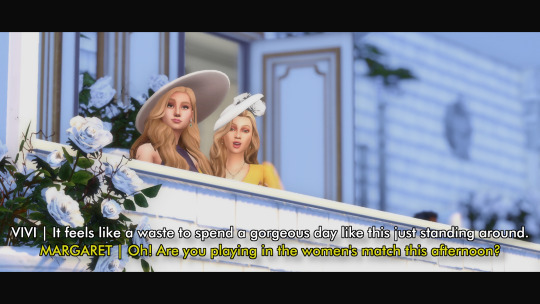


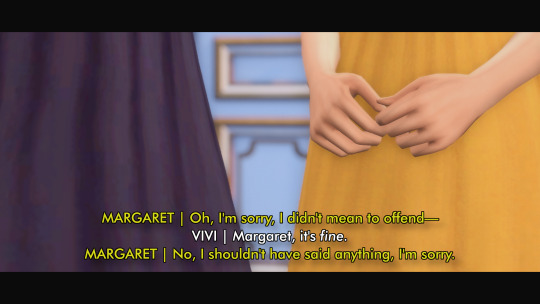



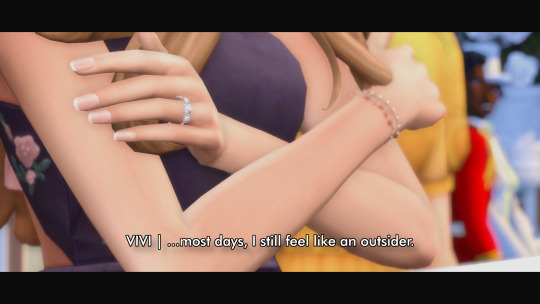
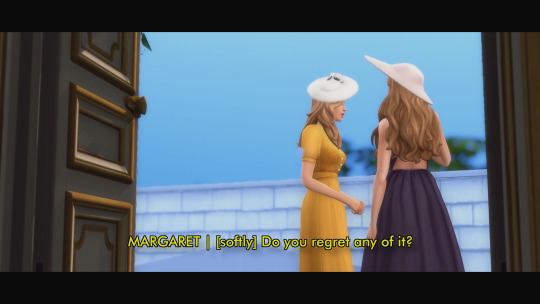



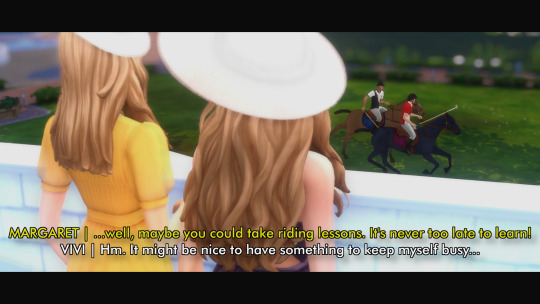
Previous | Chapter Start | Beginning | Next
author’s note: thanks to @the-lancasters for collaborating >:)
Transcript below the cut.
11:20 AM / May 14th, 2016
[hoofbeats, men shouting]
VIVI | [offscreen] It’s such a beautiful day...
VIVI | It feels like a waste to spend a gorgeous day like this standing around.
MARGARET | Oh! Are you playing in the women’s match this afternoon?
VIVI | Me? Oh laws, no.
MARGARET | Why not? Your husband brought his pony, didn’t you bring yours?
VIVI | No, I...I don’t actually know how to ride.
MARGARET | Really? You don’t know how to ride? Didn’t you have lessons as a girl?
VIVI | Er...no. My parents are dentists, I didn’t grow up with horses and stables.
MARGARET | Oh, I’m sorry, I didn’t mean to offend —
VIVI | Margaret, it’s fine.
MARGARET | No, I shouldn’t have said anything, I’m sorry.
MARGARET | Since I’ve already put my foot in my mouth...can I ask a question?
VIVI | Er...I suppose.
MARGARET | What was it like to marry in? Your life must be so different now.
VIVI | It’s been...an adjustment. I shouldn’t complain, everyone has been so kind, but —
MARGARET | But what?
VIVI | Well...to tell you the truth, I thought it would get easier after a while. But we’ve been married almost a year now, and most days...
VIVI | ...most days, I still feel like an outsider.
MARGARET | [softly] Do you regret any of it?
VIVI | ...
MARGARET | Vivi? Are you alright?
VIVI | [sighs] Everyone has regrets, don’t they? I try not to think about the what-ifs. Regret is just part of life, but unhappiness? Unhappiness is a choice.
VIVI | Anyway...I’m choosing to make the best of things. I’m choosing to be happy.
MARGARET | Right...
MARGARET | ...well, maybe you could take riding lessons? It’s never too late to learn.
VIVI | Hm. It might be nice to have something to keep myself busy...
#armorica story#chapter 2#chapter 2 part 3#behind the scenes#character: vivienne meijer#character: jacques st. fleur#armorica collabs#the-lancasters#character: margaret lancaster#character: robert lancaster
35 notes
·
View notes
Note
For the storytelling ask: 1, 5, and 11 😊
what’s the last screenshot you’ve taken for your story?

5. how do you choose your characters’ names?
I prefer to give my characters names which are easy to spell and pronounce, slightly old-fashioned, and uncommon on royal simblr. I have a few as-of-yet-unborn characters with really common names, so I've given them unique variants on those names OR really unusual nicknames. Please pour one out for Margaret "Pidge" St. Fleur, who needs all the thoughts and prayers she can get.
11. why have you decided to tell this story? are there any messages or meanings within it?
I think my fascination with royal families stems to my early childhood and a (possibly apocryphal) story I heard about Princess Diana having been made to wait outside in the rain after arriving to an event before the Queen -- protocol dictated that she couldn't enter a building before the higher-ranking Queen. As an American kid, it blew my mind that anyone would care about hierarchy to the point that they'd make someone wait in the rain because they were lower-ranking than someone else. Everything about it felt absolutely absurd, a game of pretend taken to extremes. The idea of having an entire family that had all agreed to play along with this weird idea that some of them were inherently higher-ranking and worth more than others due to accident of birth blew my mind. A lot of this story is just me playing around with those ideas and asking myself questions about what it might feel like to exist in that kind of family. I'm also playing around with ideas about family, loyalty, and gender, but I don't know if I have a coherent thesis on any of those topics significantly more complex than "we live in a society."
storytelling asks -> accepting
5 notes
·
View notes